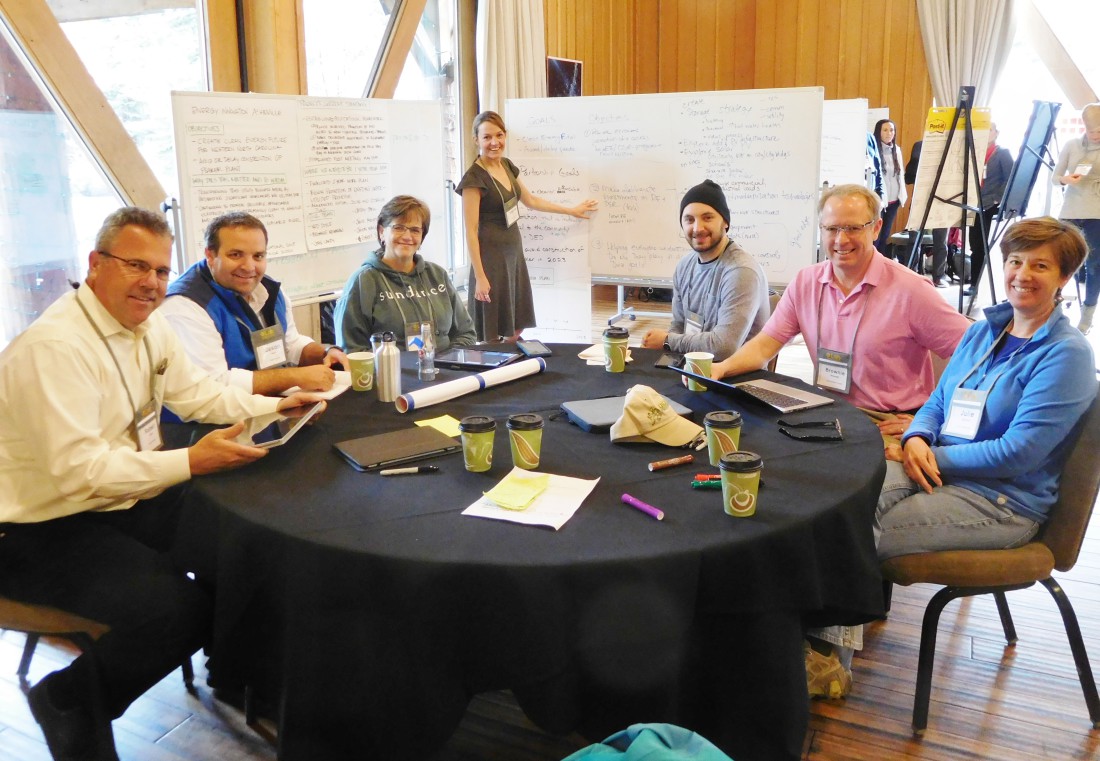Where do you go to develop a framework for a comprehensive community energy strategy that has never been done before in the United States? Answer: the Rocky Mountain Institute’s annual e-LAB ACCELERATOR program, A Boot Camp for Electricity Innovation. The four-day intensive program was held at the Sundance Resort, founded by Robert Redford in 1969 in Sundance, Utah. I was one of seven team members from Western North Carolina who participated April 24-27.
Only 13 projects were selected for this year’s program, and the WNC Energy Innovation Team project was one of those few accepted.

A prime reason the WNC energy project was chosen was its collaborative community approach to addressing complex energy challenges that included a utility provider, in our case, Duke Energy. Among the factors that led to the collaborative approach were: a controversial, legislatively fast-tracked “modernization plan” to replace the Lake Julian coal-fired system with natural gas turbines; the threat of an additional natural gas turbine for projected “peak power” demands in the future; community interest in and objections to the plan; the N.C. Utility Commission’s orders to report annually on the modernization efforts; and the newly formed WNC Energy Innovation Task Force.
The WNC Energy Innovation Team comprised both Asheville and Buncombe community representatives and representatives from Duke Energy. Brownie Newman, vice chair of the Buncombe County Board of Commissioners; Julie Mayfield, co-director of MountainTrue and recently elected to Asheville City Council; and Cathy Ball, the city’s executive director of Planning and Multimodal Transportation and were joined by Duke Energy’s representatives, including Robert Sipes, general manager of the Duke Energy West Zone; John Landy, distributed energy specialist; and Jason Walls, community relations and communications manager.
Our Energy Innovation Team arrived at three primary approaches. First, to provide increased and easier access to existing and new energy efficiency and demand-side management programs that initially target peak demand issues. The peak energy demand for WNC comes regularly, however infrequently, on the coldest days of the winter from 5-9 a.m. Second, to make deliberate investments by Duke Energy and the community in distributed energy resources in a range of emerging technologies such as solar energy and utility scale energy storage, customer energy storage, grid modernization and greater efficiency in transmission. Finally, engage the community and energy customers to help us all understand the role we play in creating the best energy future and avoiding the peaker plant.
Strategies
What matters more are concrete strategies to achieve those ends.
For the first objective, an outline of strategies included: initially focus on increasing the residential and business sector’s participation in Duke’s Energy Wise program; increase access and participation in the Energy House Call program; increase awareness of and participation in the New Homes Construction programs; coordinate and promote community efforts such as the WNC Green Building Council’s Green Gauge program; promote and create new low-income weatherization programs; increase the effectiveness and coordination of existing Home Energy Improvement programs with others available; expand the adoption of LED lighting; link heating assistance programs with energy efficiency/demand-side management programs (heating assistance needs are directly related to peak demand challenges); create community energy and sustainability related competitions and collaborate, coordinate and support faith-based organization efforts at weatherization and energy efficiency.
For the second objective, we outlined short- and long-term strategies for energy storage, solar energy expansion and other technologies. For energy storage, Duke Energy has committed to installing at least 5 megawatts of utility scale energy storage, with a strong likelihood of more capacity in the near future. Concurrently, the EITF effort would include developing energy storage options for residential, commercial and industrial customers. Duke Energy has committed to at least 15 megawatts of new utility owned solar energy. This is a good start, however the region has the potential for much more, such as municipal solar installations, community solar projects and residential solar opportunities. Barriers to expanding clean energy are not technical issues or economics, but rather political and regulatory.
For the third objective, our primary strategy is to solicit input from all sectors of the community in an open process with the newly formed EITF.
Success will not be achieved by mandates, but by community collaboration and cooperation. To this end, our team understood that creating community awareness and education programs will educate and inform the public on the challenges and options for us all.
These informational programs are planned to be at the neighborhood level to stimulate ideas and dialogue, as well as information to be available at websites and related social media.




Hi Ned: I intend on meeting you when I move down there full time to get involved in Asheville with activist. Would you check out my article under Commentary entitled;The Failure of Envirommentalism.
My Question is would you clarify your statement of,” success will not be achieved by mandates, but by community collaboration and cooperation.” Thanks
zigzgzen …. “success not by mandates..” By that I mean we are in a new set of circumstances now in the energy / environmental / economic arenas and finding a path forward requires input and cooperation from all sectors for progress. What are (for example) homeowners willing and able to do to both save energy and produce their own? What can and will business and industry do for peak demand reduction? How can these efforts be integrated into a developing a ‘smart grid’ scenario of two way exchanges of information and energy? We are beyond a traditional utility model of “take it or leave it” energy production and sale. As the technology is emerging rapidly for cost effective independent power (for example solar & storage), how will that impact the overall regional needs for a distributed grid? The idea of ‘mandates’ in the energy sector is pretty much doomed to fail, if for no other reason no one knows what to mandate as the calculus is shifting.
Thanks for sharing your insights on the EITF process so far, Ned.
when I think of mandates,I think of the Clean Power Plan/Obama, that is being held up by 21 republican governors and 3 democratic governors,which has mandates from EPA including for electric power plants.There are mandates coming from EPA for Methane released as natural gas plants,and soon mandates for aviation as EPA is working on them now.So I see mandates as good and we need more but your specifics in the energy industry I’m not sure of but would say isn’t the goal zero carbon discharge for China and U.S. by 2050 ? Isn’t the goal a zero carbon discharge economy ? Mandates would be for that,right ?
As you note zizaggen, mandates – even for rational objectives – are often opposed by those with opposing interests, as in this case the fossil fuels and nuclear industries and their lust for profits, no matter the consequences to people and planet. Mandates such as the CPP and such do have value, in my view, and are part of the solutions. I say mandates alone won’t be successful due to entrenched opposition as well as being ‘top down’ in nature. However, community cooperation and collaboration in a context of the mandates to find a path forward should have a greater likelyhood of success. At least that’s what the top experts in these matters say, in other words it’s a combination of these efforts.
The EITF is supposedly an Asheville-Buncombe jurisdiction matter in partnership with Duke Energy. Ned’s FB page says he lives in Hendersonville. Interesting he ended up writing this.
It’s about his free speech if he wants to write an Op/Ed, but it seems like Ned has some ongoing key EITF role from this piece. His mention of mandates they way he has could give the impression he—and the entire EITF body—doesn’t think an NC Clean Power Plan would be very useful, nor the Paris climate accords… because the possibility of the NC CPP and Paris are linked.
Perhaps if you had arrived on time for the initial EITF meeting, some of your confusion would be avoided regarding the CPP and Climate Accord connections. A good cardio workout jumping to a conclusion.
The EITF is indeed initially and primarily an Asheville city, Buncombe County effort in partnership with Duke Energy Progress’s western region, however … it is also a keystone for the entire WNC region and if successful may provide insight and guidance for all of NC. In light of over 30 years as a WNC resident (yes, in Henderson County) working towards a sustainable energy future from the 80’s with the original Mother Earth News ECco-Village to the 10 years of the Southern Energy & Environment Expo to 15 years of “Our Southern Community” each/all on energy, environment and economic in our regional community and now working as an energy consultant and community coordinator, I do support the EITF and overall effort. As a result of that experience and background, I did participate and write the article…. even though I’m not officially on the EITF.
You know what, Ned, when I can get to these EITF things is totally irrelevant to this opinion piece. I have no control over when and where these things take place per what I can fit into my life these days.
It is clear you mention mandates, Ned, e.g. “The idea of ‘mandates’ in the energy sector is pretty much doomed to fail, if for no other reason no one knows what to mandate as the calculus is shifting.” But you are starting to clarify this is strictly an opinion piece on your part, while at the same time you are consulting and coordinating on some sector of the community’s behalf.
I understand there are a range of views about what folks think will happen next on the CleanTech front. I would like the EITF to have a more defined, full local, state, and national policy position soon.
Join the Coalition of the Willing!
https://www.youtube.com/watch?v=_k9id6euk94
Excellent talk from Amory! Thanks, Keith!
It is a useful video. There’s a lot of great information these days.
Thank you Ned for this well written article informing the public!
You’re welcome Steffi, and I appreciate MX allowing me to cover and share this really important story/issue for the region. It’s a developing effort and I’d encourage all to find out more and take part. It’s an intersection of energy, economics and the environment for WNC and is being watched nationally. Next meeting is this Friday 10- noon at City Hall building as working groups and more are being established. It will be a long term project, but off to a very good start!